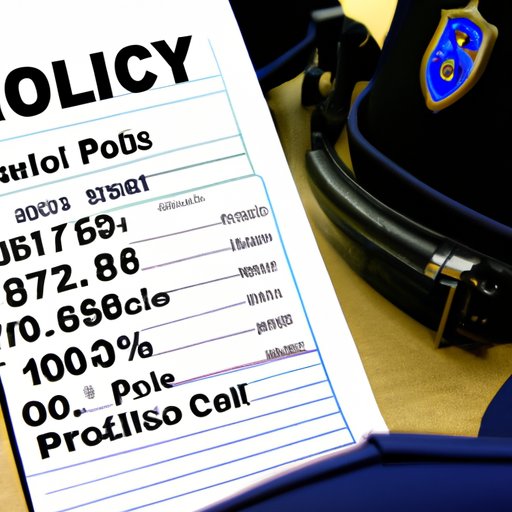Introduction
Becoming a police officer is an honorable and rewarding career choice. However, it requires a significant financial commitment. In order to join the force, you must attend a police academy, which involves tuition fees, books and supplies, and other associated expenses. This article will explore the cost of attending a police academy, discuss how to budget for the training, and analyze the long-term implications of joining the police force.

A Cost Breakdown of Police Academy Tuition and Fees
The cost of attending a police academy varies depending on the location and type of academy. Generally speaking, tuition fees range from $3,000 to $15,000. Books and supplies, such as uniforms and firearms, can add an additional $1,000 to $3,000 to the total cost. Additionally, there are other fees associated with police academy training, such as background checks, drug tests, and physical examinations, that can cost up to $500.
In addition to tuition and other fees, you may need to consider the cost of housing and transportation if you will be relocating for the duration of your training. Depending on the area, housing can range from $600 to $1,200 per month, and transportation costs can vary depending on the distance you will be traveling.
How to Budget for Police Academy Training
When considering the cost of attending a police academy, it is important to explore all available financial aid options. Many academies offer scholarships and grants to help offset the cost of tuition and other fees. Additionally, there are federal and state financial aid programs available, such as Pell Grants and Stafford Loans, that can help pay for the cost of training.
In order to budget effectively for police academy training, it is important to create a plan that includes all anticipated expenses. This should include tuition and fees, as well as housing and transportation costs. Additionally, it is important to consider any additional costs, such as meals and entertainment, that may arise during the duration of your training.

Exploring the Financial Commitment of Becoming a Police Officer
It is important to understand that the financial commitment of becoming a police officer does not end with the completion of police academy training. Once you have completed the training, you will need to consider the long-term implications of joining the police force. This includes understanding the potential salary of a police officer, as well as the job security and benefits that come with the profession.
In general, the starting salary of a police officer is around $50,000 per year. This can vary based on the area and the size of the department. Additionally, most police officers receive benefits such as health insurance, retirement plans, and vacation time. These benefits can add significantly to the financial commitment of joining the police force.
Comparing the Cost of Police Academy Training Programs
When choosing a police academy, it is important to compare the cost of different training programs. Some police academies are state-run and offer lower tuition rates than private academies. Additionally, some academies offer scholarships and grants to help offset the cost of tuition and other fees. It is also important to research the availability of payment plans and other financing options.
Additionally, it is important to consider the quality of the training program when comparing the cost of different academies. While some academies may be more affordable, they may not provide the same level of instruction and preparation as more expensive programs.

Understanding the Total Cost of Attending a Police Academy
When determining the total cost of attending a police academy, it is important to consider all associated expenses. This includes tuition and fees, books and supplies, as well as housing and transportation costs. Additionally, you may need to factor in additional costs such as meals and entertainment. It is also important to explore financial aid options and payment plans that can help cover the cost of training.
Analyzing the Financial Impact of Joining the Police Force
In addition to the cost of attending a police academy, it is important to consider the long-term financial implications of joining the police force. This includes understanding the potential salary of a police officer, as well as the job security and benefits that come with the profession. Additionally, it is important to factor in the cost of continuing education and training, which is often required for advancement in the field.
Conclusion
Becoming a police officer requires a significant financial commitment. In order to join the force, you must attend a police academy, which involves tuition fees, books and supplies, and other associated expenses. This article has explored the cost of attending a police academy, discussed how to budget for the training, and analyzed the long-term implications of joining the police force. When determining the total cost of attending a police academy, it is important to consider all associated expenses, such as tuition and fees, books and supplies, housing and transportation costs, as well as exploring financial aid options and payment plans. Additionally, it is important to understand the job security and benefits that come with the profession, as well as the cost of continuing education and training.
(Note: Is this article not meeting your expectations? Do you have knowledge or insights to share? Unlock new opportunities and expand your reach by joining our authors team. Click Registration to join us and share your expertise with our readers.)
